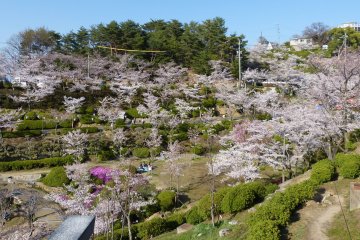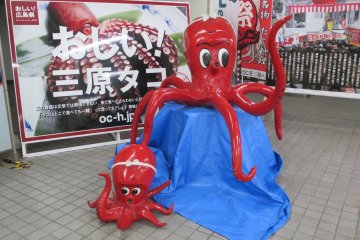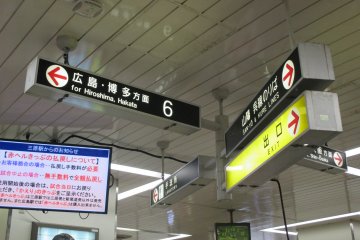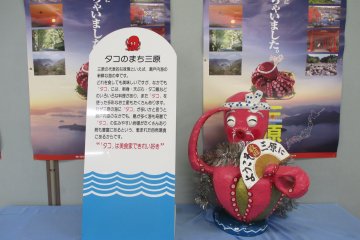Mihara Station is located in Mihara city in Hiroshima Prefecture. It lies between Hiroshima city and Okayama on the JR Sanyo Shinkansen Line. It takes half an hour from Hiroshima Station to get to Mihara and an hour from Okayama Station. Mihara Station also connects to several other important locations by Shinkansen, such as Hakata Station in Fukuoka and Shin-Osaka Station. However it's important to note that Sanyo Shinkansen Nozomi trains, which stop at Shin-Kobe Station, Okayama Station, Hiroshima Station, Kokura Station and Hakata Station, do not stop at Mihara.
Other lines available include the Kure Line for Takehara and Kure, and the Sanyo Main Lines for Saijo, Onomichi and Fukuyama.
Despite being located in the beautiful Seto Inland Sea and surrounded by lush, green mountains, perhaps the best thing about Mihara Station is how well laid out the directions are. Signs point in the exact direction of lines, the lavatories and other facilities. Due to how straightforward the signs are, navigating the station is a simple task.
Furthermore, posters displaying nearby tourist spots are at every corner of the station. Some of these nearby areas include Mihara Castle, which is only a 13-minute walk from the station, Sunami Seashore Park and Miharashi Hot Springs.
The station itself is quite small. It is made up of three main parts. There are two entrances which both lead into the first area, where the information desk is located and where you can purchase tickets. There are also tables around the room with tourist information and small stores to purchase snacks and souvenirs.
Once you buy your tickets, you pass through the ticket gates to the second part of the station. The signs in this area lead to local lines. An escalator from here takes you to the Shinkansen area, the third part of the station.
As soon as you reach the Shinkansen area, you will find it hard not to notice several octopus statues and a giant daruma doll. Throughout the station, octopus flags and decorations are laid out. Octopus is Mihara's specialty food, thus Mihara is known as the octopus town, and the station will make sure you remember that.
Aside from octopus decorations, other displays add a historical feel to the station. There are several miniatures of the station itself throughout Shinkansen area. There are also schematics showing the original building plans for the station. Further adding to the historical feel of the station is samurai armor on display, a site one would expect to see at a castle rather than at a train station. It's a great sight for those interested in feudal Japan.
Another great aspect to the station is it's spaciousness. The station itself is uncrowded, the rooms wide and there are seats all throughout for those wanting to rest while traveling.
The station's straightforward layout, unexpected decor and spaciousness make Mihara Station a nice change of pace during travel.











